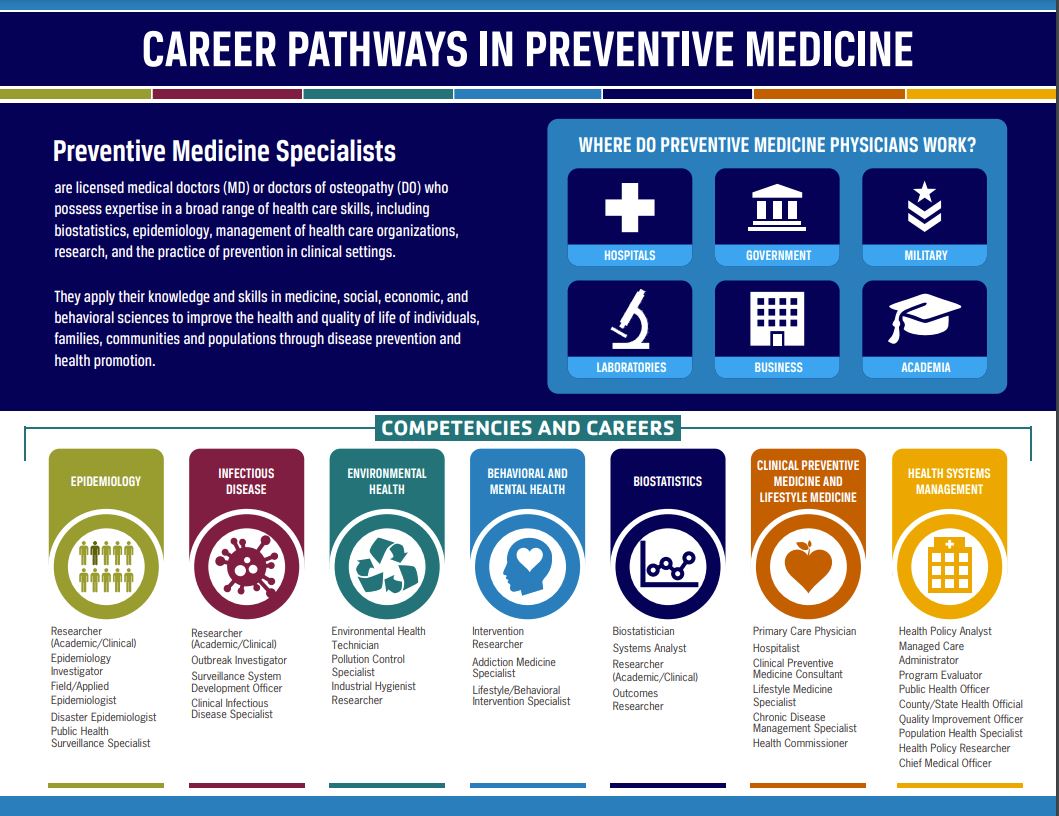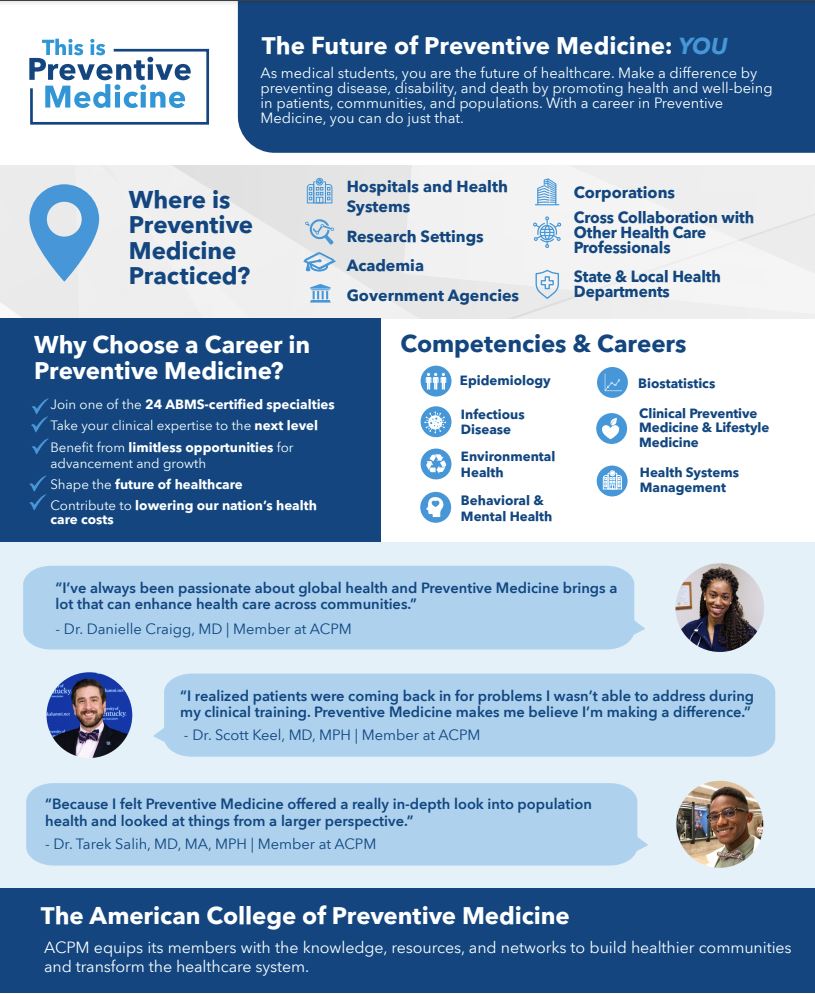WHAT IS PREVENTIVE MEDICINE?
Preventive Medicine (PM) is one of 24 recognized medical specialties by the American Board of Preventive Medicine (ABMS).
Preventive medicine is the practice of improving the health and quality of life of individuals, families, communities, and populations through disease prevention and health promotion. The goal is to ultimately prevent disease, disability and death.
Preventive medicine specialists are licensed physicians with either a Medical doctors (MD) or Doctors of osteopathy (DO) degree.
Preventive Medicine's three specialty areas share common core competencies, but emphasize different populations, environments or practice settings:
- Public Health/General Preventive Medicine (PH/GPM)
- Occupational and Environmental Medicine (OEM)
- Aerospace Medicine (AM)
WHY SHOULD I CHOOSE A CAREER IN PREVENTIVE MEDICINE?
- Join one of 24 ABMS-Certified Specialties
- Take your clinical expertise to the next level
- Benefit from limitless opportunities for advancement and growth
- Shape the future of healthcare
- Contribute to lowering our nation’s healthcare costs
- Experience a balanced lifestyle with low burnout and high job satisfaction
WHERE CAN I WORK AS A PM PHYSICIAN?
Preventive medicine is a specialty that bridges clinical practice and public health. Physicians completing a PM residency gain a breadth of skills that opens many potential career paths in population health system management, public health and epidemiology, clinical care, health informatics, public health policy development and much more.
Physicians who are board certified in Preventive Medicine hold a variety of positions from chief medical officers of private corporations, directors of state/local health departments, policymakers within governmental agencies including military branches, to program developers for multi-national non-governmental organizations, etc.
These positions are in Fortune 100 Companies, all levels of government, educational institutions, organized medical care programs in industry, as well as voluntary health agencies and professional health organizations.

HOW DO I GET TRAINED IN PREVENTIVE MEDICINE RESIDENCY?
Completion of residency training in preventive medicine is an essential step to become board-certified in one or more of the preventive medicine specialty areas of Public Health and General Preventive Medicine, Occupational Medicine and Aerospace Medicine. There are currently 67 accredited preventive medicine residency training programs in the United States, each taking an individualized approach to training.
All PM residency programs are accredited by the Accreditation Council for Graduate Medical Education (ACGME).
LEARN MORE
There are three main ways to begin your Preventive Medicine residency training:
- Pathway 1: Medical School --> PGY-1 year (transitional year or prelim year) --> Preventive Medicine residency; 3 years total
- Pathway 2: Medical School --> clinical residency (Family Medicine, Internal Medicine, Pediatrics, etc.) --> Preventive Medicine residency; 5 years total
- Pathway 3: Medical School --> Combined clinical residency and Preventive Medicine Residency; 4-5 years total

WHAT IS THE RESIDENCY APPLICATION PROCESS?
Preventive Medicine Residency Directory
Application platform: Most Preventive Medicine residency programs use the Electronic Residency Application Service. Some programs accept applications directly.
Here are the list of PH/GPM programs participating in ERAS. Refer to the Residency Directory above to contact programs and confirm their application process.
Match Platform: Beginning in 2025, PH/GPM programs and OEM programs have joined the NRMP Residency Match (a.k.a. “The Match”). Most eligible PH/GPM programs are participating in the Match. Refer to the directory above to contact programs and confirm their match/selection process.
General Application Guide for PH/GPM Programs
2024-2025 Residency Application Timeline (NRMP and ERAS):
- September 4 - Residency applicants may begin submitting MyERAS® applications to programs . For those programs not participating in ERAS, contact the program’s directly for timeline.
- September 15 – NRMP Match Registration Opens. For programs not participating in the match, contact the program directly for process and timeline.
- September 25 - Residency programs may begin reviewing MyERAS applications
- January 31 – NRMP Registration Deadline
- February 3 – Ranking Opens
- March 3 – Rank Order List Certification Deadline
- March 17 – 21 – Match Week
- March 21 – Match Day
ERAS and NRMP Links:
- ERAS for Applicants
- PHGPM Programs Participating in ERAS
- ERAS Timeline
- NRMP for Applicants
- NRMP Program Directory
- NRMP Timeline
ADDITIONAL LINKS
- Why I care – A story of 2024 medical school graduate, Nadine Jawad, on her journey to Preventive Medicine
- Career options in Preventive Medicine - Hear from preventive Medicine physicians in governmental public health, academia, military and pharmaceutical medicine.
- This is Preventive Medicine – A Fact Sheet
- Frequently Asked Questions on Preventive Medicine
I AM IN MEDICAL SCHOOL. HOW CAN I GET STARTED?
- If you are in a medical school affiliated with a PM residency program, reach out to the program to see if they have any 4th year elective rotations for medical students.
- Start/Join a Preventive Medicine Interest Group at your school
- Already have a Preventive Medicine Interest Group? Contact ACPM so we can connect you with our Medical Student Section
- Join ACPM and Become a Part of the Medical Student Section
CAN I JOIN ACPM? WHAT ARE THE BENEFITS FOR MEDICAL STUDENTS?
Any current medical student can join the College for a membership fee of $30 per year.
-
Improve Your Knowledge and Build Your Skills
- Discounts for Annual Conference
- Travel scholarships available to attend ACPM Annual Conference
- Earn certificates in the Ten Essential Public Health Services for Physicians and Military Environmental Exposures — at no extra cost
-
Connect with Leaders in the Field and Contribute to the College
- Become a leader within the Medical Student Section
- Serve on Committees of the College
- Represent ACPM in external groups (i.e.,AMA Medical Student Section)
- Participate in networking and mentor programs
For more information, contact Anita Balan, Director, Residency Engagement and Development.

